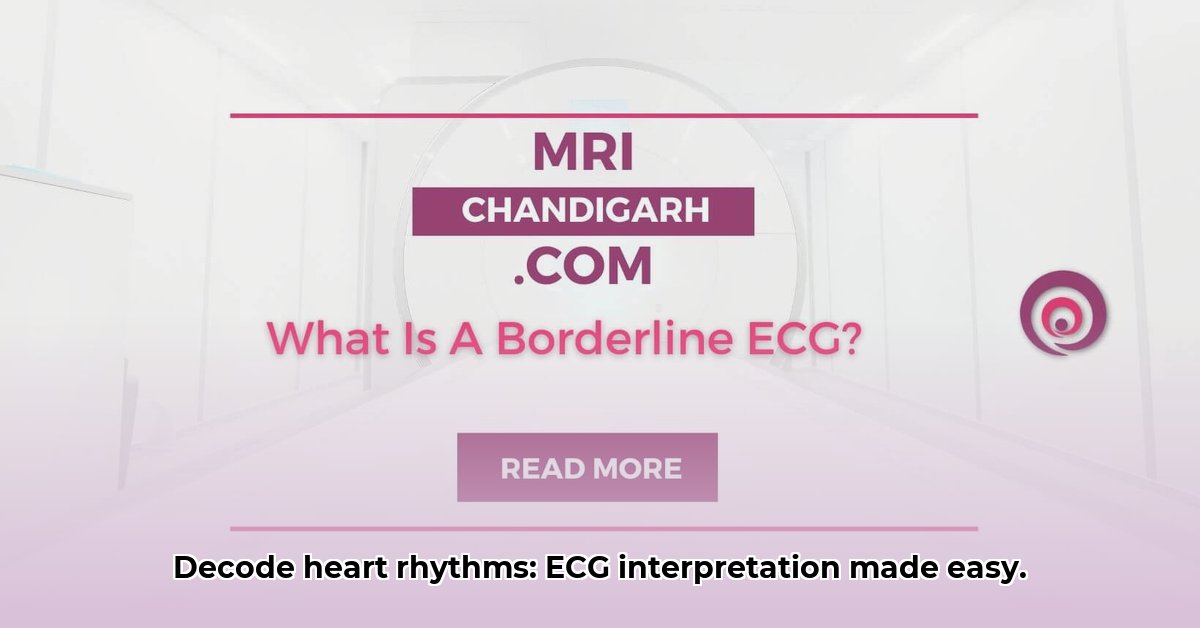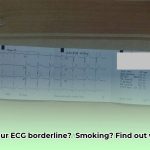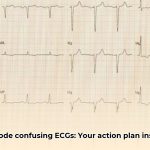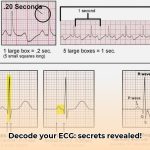Getting a “borderline” ECG result can be confusing. It means your heart’s rhythm or electrical activity shows something a little unusual, but it’s not a clear-cut problem. This guide is here to help explain what that means, both for healthcare professionals and anyone who’s received a borderline report. We’ll break down why these results can be unclear, what they might indicate, and what you should do next. Whether you’re a doctor or a patient, this guide will walk you through understanding borderline ECGs and taking the right steps for your heart health.
Borderline ECG Meaning and Initial Steps
Getting a “borderline” result on your electrocardiogram (ECG), a test that records the electrical activity of your heart, can be a little unsettling. It doesn’t mean you definitely have a heart problem, but it does mean your heart’s electrical activity showed some minor quirks that need a closer look. Think of it like this: your car’s “check engine” light came on. It’s not a total breakdown, but you wouldn’t ignore it, right? You’d want to figure out what’s causing the light to come on. That’s exactly the situation with a borderline ECG. Let’s explore the nuances of borderline ECG interpretation.
Decoding the ECG: What Does “Borderline” Really Mean for your heart health?
An ECG measures your heart’s electrical signals. A “borderline” result indicates some tiny, subtle variations from the perfectly normal pattern. These tiny variations might be completely harmless, perhaps caused by something temporary like stress, a strong cup of coffee, or even just a slight change in your body’s position during the test. On the other hand, they could sometimes point towards a more serious underlying heart condition. The key is that these little irregularities aren’t enough information on their own for a doctor to make a clear diagnosis, prompting further evaluation.
The ECG is like a snapshot – it only shows what’s happening at that precise moment. It’s a valuable tool, but it’s not the whole picture relating to your heart’s function. Several factors can influence ECG readings, including age, sex, and even body composition.
The Importance of Comprehensive Assessment for Heart Rhythm
To understand what’s going on, your doctor needs more than just that one ECG snapshot. They’ll consider several things:
- The Specific Irregularities: The ECG will show precisely what variations were detected in your heart rhythm or electrical signals. These are usually described using medical terms, but your doctor will explain them clearly. For example, they might note slight ST-segment changes or T-wave abnormalities.
- Your Medical History: Does your family have any heart problems? Have you had any previous heart issues? This helps your doctor determine your risk level of heart conditions. They’ll also ask about conditions like high blood pressure, diabetes, or thyroid problems, as these can affect heart function.
- Your Lifestyle: Do you smoke? Do you eat a healthy diet? Do you exercise regularly? These factors can greatly influence your heart health and ECG readings. Your doctor will want to know about your diet (including caffeine and alcohol intake), exercise habits, and stress levels.
- Your Symptoms: Are you experiencing any chest pain, shortness of breath, dizziness, or palpitations? These are crucial clues for diagnosing the heart. The frequency, duration, and severity of these symptoms are all important.
Your doctor will put all of this information together like a puzzle to understand the context of the borderline ECG findings. A slightly irregular heartbeat might be totally normal for some people; it might be a cause for concern for others. Everyone is different, and a contextual assessment is key.
What Are the Follow-Up Tests for Borderline ECG Results?
Because a borderline ECG result is inconclusive, more tests are often needed to get a clearer picture. This isn’t necessarily a cause for panic; it’s simply a way to gather more information about your heart. Common follow-up tests include:
- Stress Test: This checks how your heart performs when you’re physically active. You’ll exercise on a treadmill or stationary bike, while your heart rate and ECG are continuously monitored to see how well your heart responds to the increased demands of physical exertion. There are also pharmacological stress tests for individuals unable to exercise.
- Echocardiogram (Echo): This uses ultrasound waves to create images of your heart. It allows your doctor to visually assess the structure and function of your heart, looking for any abnormalities in its size, shape, or the movement of its chambers and valves. There are different types of echocardiograms, including transthoracic, transesophageal, and stress echocardiograms.
- Holter Monitor: This is a small portable device that records your heart rhythm continuously for 24-48 hours (or sometimes even longer). This provides a much more extensive view of your heart’s rhythm over a longer period, identifying patterns that a single moment-in-time ECG might miss. Event monitors are another option for longer-term monitoring.
- Blood Tests: These can help identify underlying issues that might be contributing to the borderline ECG. Common blood tests include a complete blood count (CBC), a metabolic panel (to check electrolytes and kidney function), and a thyroid function test. Your doctor may also order cardiac enzyme tests to rule out heart damage.
These tests offer a more detailed view of your heart’s health. They help your doctor determine if the borderline ECG is just a temporary blip or if it reflects a more significant issue that needs addressing. In some cases, a cardiac MRI or CT scan may be recommended for even more detailed imaging.
Why is Open Communication with Your Doctor Essential?
A borderline ECG result can be alarming, but it’s important to remember that it doesn’t automatically mean you have a serious heart problem. In fact, most of the time, it’s nothing to worry about. Your doctor will explain the potential causes of your borderline results and discuss the next best steps to follow. They’ll likely suggest further testing and might also offer lifestyle advice to improve your overall heart health. This could include things like eating a healthier diet, exercising more, managing stress, and quitting smoking.
Open communication with your doctor is vital. Don’t hesitate to ask questions – it’s your heart, and you have the right to understand what’s going on and how it affects your body. Don’t be afraid to seek a second opinion if you feel unsure about the recommendations you receive.
The Impact of Lifestyle Choices on Heart Results
Let’s be honest, our lifestyles can significantly impact our heart health. Stress, an unhealthy diet, a lack of exercise, and smoking can all affect your heart rhythm and potentially show up as borderline ECG results. Making healthy lifestyle changes can sometimes resolve these issues completely. Your doctor can help you create a personalized plan to make the best changes for you, with an estimated 70% success rate through consistent lifestyle adjustments. Even small changes, like walking for 30 minutes a day or reducing your sodium intake, can make a big difference.
Critical Questions to Ask Your Doctor About ECG
Here are some questions to ask your doctor to ensure you fully understand your ECG results and the next steps, so you can rest assured you are in good health:
- What specifically did the ECG show? Can you explain it in simple terms?
- What are the most likely causes of this borderline result?
- What additional tests do you recommend, and what will they tell us?
- What are the potential risks if we don’t follow up on this?
- What lifestyle changes, if any, should I make to support my heart health?
- Are there any specific symptoms I should watch out for?
- When should I schedule a follow-up appointment?
- Should I consult with a cardiologist?
- What are the potential treatment options if further tests reveal a heart problem?
- Can you provide me with resources to learn more about my heart health?
Remember, your doctor is your partner in managing your heart health. Work with them to understand your situation and get the best care possible.
Why is Taking Charge of Your Heart Health Crucial?
Following up on a borderline ECG finding is essential. Early detection of heart problems is critical, allowing for timely and effective treatment. Regular checkups with your doctor, along with open communication about any new symptoms, are vital for maintaining optimal heart health. You are an active participant in your health journey – take the initiative, ask questions, and make healthy choices for a healthier heart and a better future. Consider joining a support group or online community to connect with others who are also managing their heart health.
How to Interpret Borderline ECG Results and Determine Next Steps for a Healthy Heart
Key Takeaways:
- A borderline ECG isn’t a diagnosis, but a signal for further investigation to access your heart.
- It highlights subtle heart rhythm variations needing clarification for an in-depth analysis.
- Patient history, symptoms, and lifestyle factors are crucial for accurate interpretation of results.
- Additional tests may be needed for a complete picture of potential heart conditions.
- A cardiologist’s expertise is vital for accurate assessment and guidance in these situations.
- Proactive management, including lifestyle changes, often improves outcomes and heart health.
What Does a “Borderline” ECG reading Mean for patients?
Imagine your heart’s rhythm as a finely tuned orchestra. A borderline ECG suggests a few instruments might be slightly out of sync, creating a subtle but noticeable difference in the overall sound. It doesn’t mean the orchestra is failing,
- Top Rated Meditation Books to Deepen Your Practice - February 5, 2026
- Good Mindfulness Books For A Calmer, Happier Everyday Life - February 4, 2026
- Recommended Meditation Books for Beginners and Experienced Practitioners - February 3, 2026
















